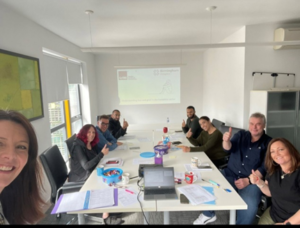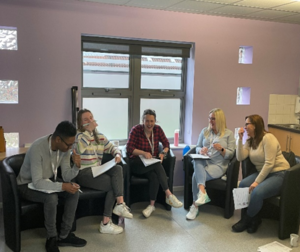 Talking about end-of-life care with someone experiencing homelessness is important for several reasons.
Talking about end-of-life care with someone experiencing homelessness is important for several reasons.
Firstly, like anyone else, individuals experiencing homelessness have the right to make informed decisions about their end-of-life care, yet they might not have easy access to the information or support needed to make these decisions. By discussing end-of-life care, we ensure their wishes are respected and met as much as possible.
Secondly, many individuals who are or who have experienced homelessness are more likely to have chronic health conditions that are often unaddressed due to lack of access to healthcare, making conversations about end-of-life care not only relevant but necessary.
Additionally, talking about end-of-life care offers a sense of dignity and respect to individuals who might frequently feel marginalised by society. It shows them that their lives matter, their preferences are important, and that they are deserving of compassion and care in their final days. This approach not only addresses their physical health needs but also provides emotional and psychological support, helping them feel less isolated and more cared for in their final moments.
In August 2023, Fairer Futures funded Birmingham Hospice and Crisis to work together to address the current barriers that those experiencing homelessness currently face in accessing timely bereavement support. Instead of simply commissioning a counselling service, the partnership team decided to use a community development approach, to build the skill base within the existing workforce to provide this support.
Birmingham Hospice and Crisis met with a group of representatives from different organisations within the homelessness sector of Birmingham and co-developed a training session aimed at upskilling workers and volunteers to support their clients and peers who are dealing with loss and grief.


Six months on, Suzanne and Angela have led 11 workshops and trained 114 individuals from over 13 organisations. The results of the project have been extremely positive, demonstrating a 100% marked increase in the workforces level of confidence to approach and have supportive conversations with their clients and peers who are coping with loss and grief. 100% of attendees also reported that after the training they felt confident in knowing where to signpost clients and peers for further support (an increase of 76%).
So what’s next? Suzanne and Angela are keen to further build on this project and explore developing the training to be delivered by people with lived experience to their peers. They are also keen to reshape the training based upon the feedback, to incorporate more in-depth education about the topics covered within the introductory session. We have learned that due to funding cuts to hospices across the UK, Suzanne was made redundant this week. This is a very sad loss to Birmingham Hospice. Suzanne, however, is moving forward to create a CIC to continue the great work she has been doing, and she will share progress on that via her LinkedIn profile.
